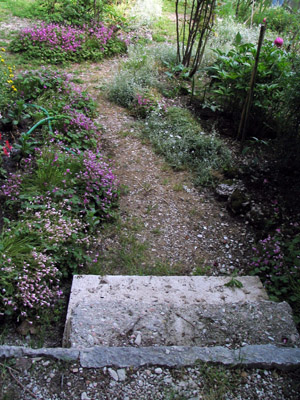| Braccini’s father, a
well-known Socialist, fled Italy to work in France, because
the Fascists would have killed him. Her grandmother wept for
him every night of the war. Her only solace came from her
daughter-in-law and granddaughter. Braccini recalls an aunt
who came to stay in their home, after her factory was bombed.
She says that family was essential during the war.
When the Allied forces arrived in Cagli, they brought relief
and the potential for freedom, but also more hardships for
the Cagliesi. Braccini says that the heaviest fighting and
greatest destruction occurred immediately after the Allies’
arrival, because the two forces clashed very close to Cagli.
Cagli lost its only train station (which was never rebuilt),
a factory, a medieval building in Piazza Matteotti, and several
dozen homes and buildings in town.
Braccini fondly recalls the American soldiers who quartered
in her spacious back yard and garden. The GIs cooked behind
her home, fashioning a makeshift canteen and decorating her
staircase with painted crosses. She remembers the GIs who
gave her their chocolate rations and playfully tugged the
ribbons in her hair.
In 1945 when the war ended, the men who had survived the
Fascist regime returned to Cagli to find a city in ruins,
but the women stronger than ever. While there was initial
resentment over the women’s new attitudes and power,
Braccini speaks of the men and women eventually beginning
to rebuild Cagli, together.
It was at this time that the construction of New Cagli began
to replace the homes that had been destroyed during the bombing.
Reflecting on the involvement of the Cagliesi women in World
War II, Braccini says, “Women--mothers!-- don’t
start wars. This war was not started by women.” She
continues by quoting Hobbes, “Homo Homini Lupus,”
men are wolves for other men.
Braccini says that many Italians who suffered through the
war are hesitant to speak of it in detail, if they speak of
it at all. She herself is most comfortable discussing it from
a historical perspective. However, she says that she feels
it is essential to speak to the present generation about her
real experiences, the truth of the war.
Braccini says, “The young must understand the history,
circumstances, and effects of totalitarianism. It is important
to understand the value of democracy, to be able to have your
own thoughts and words.
“You need to be aware that this can still happen, today.”
|




